At the close of World War I, as American troops returned home after defending democracy, Black Marionites still had to demand equal treatment as they lived and worked in an expanding, industrializing, modernizing Marion, according to a recent lecture by Dr. Margaret Sumner, associate history professor at The Ohio State University at Marion.
Battle For Equal Lunch Prices
One prominent Black business leader, Donson W. Lett, ran a new bathhouse and hair salon with his wife, Esther Gardner. In 1917, the Letts discovered that downtown lunch vendors were charging their Black employees more than white customers for meals. They were furious.
“As early members of the Chamber of Commerce, the Letts supported Marion’s business culture, but they also expected equal access ensured for all – including the right to lunch,” said Dr. Sumner. “Lett made sure to publicize this racist practice in a Cleveland newspaper and sought legal counsel.”
Black Voices Against Sexual Harrassment
During Dr. Sumner’s research, she discovered Black women complained regularly to the mayor about being sexually harassed by men on downtown streets. Some men were jailed or fined by the mayor’s office. In a small town, voices mattered, and Black citizens were not afraid to use them to demand equal treatment and justice from city leaders.
Mob Violence
Unfortunately, voices are no match for mobs. After World War I, Black citizens became targets of racist violence in communities across the nation. Marion was no different. After a white woman was found murdered near a railroad yard in 1919, black men were rounded up, questioned and released. Hundreds of white men attacked a Black neighborhood where many men were railway employees. Families fled for their lives.
“This attack was violent, but also strategic,” Dr. Sumner observed, as after the mob attack, printed posters were carefully placed around the city and on the doors of Black businesses, ordering them to leave.
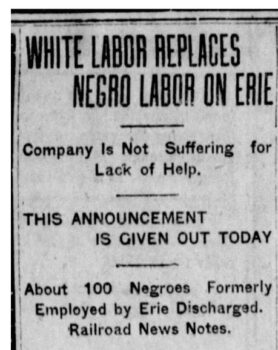
This news article appeared a few days after a mob of white men violently attacked and drove many Black families from Marion, February 2-3, 1919. Many of these families included men who worked in Erie Railroad jobs.
A few days later, The Marion Star reported all 100 Black rail employees were fired and quickly replaced with exclusively white workers. The violence faded. Black business owners like the Letts refused to leave, and determinedly opened their shops again.
Prayer Against Lynching Versus Growth of the KKK
In 1920, a year after the attack, Black Marionites led a day of public prayer, protesting racist violence and the practice of lynching. The Ohio History Connection states that the Ku Klux Klan revived nationally in the 1910s and hit peak membership by the 1920s, including a chapter in Marion. Throughout the 1920s, despite this threat, Black citizens built their churches, their businesses, and their community.
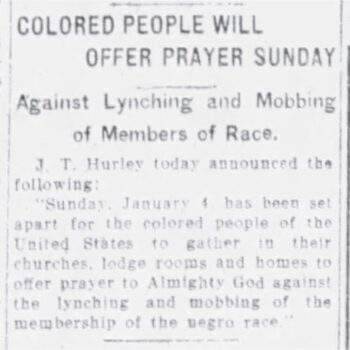
Political Activism: President Harding and the NAACP
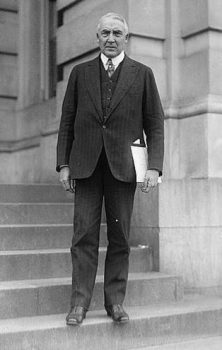
Many Black voters remained politically active in the Republican party and supported Marion native Warren G. Harding‘s election. The women of Quinn Chapel, Marion’s African Methodist Episcopal (AME) Church, all new voters in 1920, provided meals to groups visiting President-elect Harding’s famous porch. Black citizens approved of President Harding’s public condemnation of lynching in 1921 but wanted Congress to criminalize it by passing a law. This goal was championed by the National Association for the Advancement of Colored People (NAACP), founded in 1909.
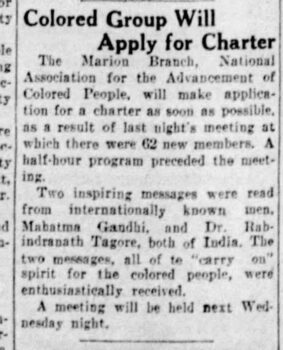
In 1930, Black leaders in Marion invited Daisy Lampkin, a nationally known NAACP organizer, to speak at Quinn Chapel about the legal and educational work of the interracial group. A month later, Marionites formed a chapter with 62 members.
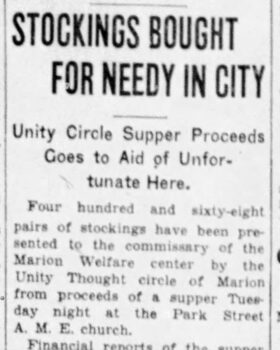
Community Outreach During the Great Depression
During the Great Depression, Black and white civic groups worked to support the growing numbers of needy people in Marion. Black voters also began voting in larger numbers for the Democratic party during the 1930s, supportive of President Franklin D. Roosevelt’s New Deal programs.
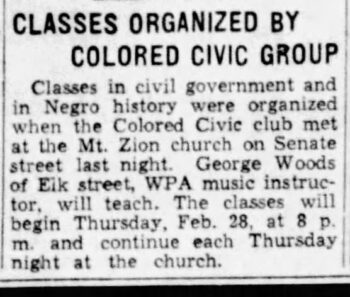
Colored Civic Club Founded
In 1940, a new Colored Civic Club launched Marion’s first lectures on Black history at Mt. Zion Baptist Church. In 1941, Marionites said goodbye to a group of young Black men, all volunteers, who joined a racially segregated military and headed to war.
For more info:
Residents are invited to learn more at the ongoing Black History exhibit at the Marion County Historical Society at 169 E. Church Street. It is open Wednesday through Sunday from 1 p.m. to 4 p.m.
Read about Black Leadership in Marion from the Civil War to World War I here.


















